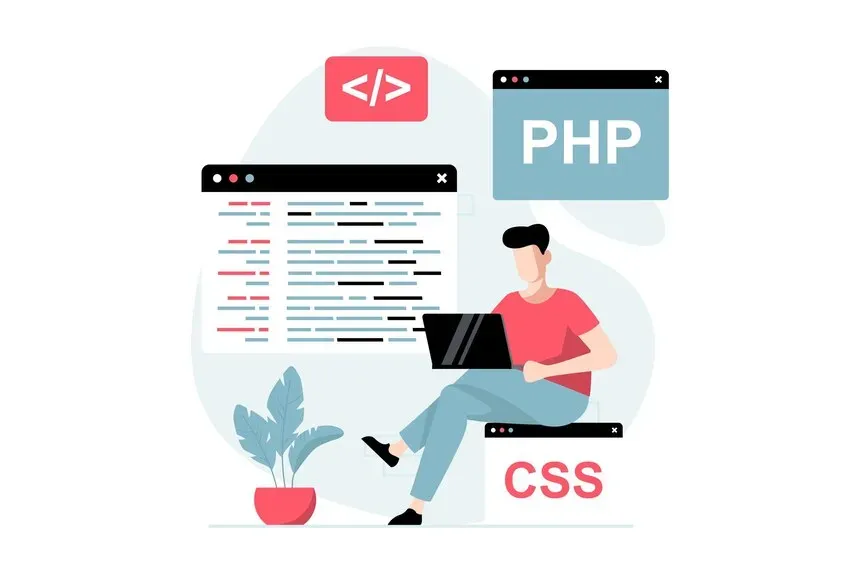
PHP is one of the most popular technologies for developing online applications. Although PHP has been around for many years, various PHP frameworks — including Symfony, CodeIgniter, Laravel, Yii, and others — have emerged as the most reliable and popular bases for creating online platforms.
Which PHP framework suits my requirements the best? This is a question that both our current and prospective customers often ask. Agiliway provides experienced advice on the best kind of framework to utilize for your project in response to this query. You may choose the best option to build a strong, dependable, and scalable online solution in collaboration with us.
What Does the Framework Mean?
Different kinds of frameworks serve as the building blocks for the web solutions created by software developers. These methods enable code organization and increase productivity. A developer may scale processes and employ CRUD concepts to reduce code by leveraging frameworks. Projects may be completed quickly by improving engineers' performance and attaining speedier computer processes. The MVC paradigm is used by the majority of frameworks to manage requests, which increases an engineer's productivity. Reviewing the four most widely used frameworks will help you see why they were more effective and offered strong scalability choices.
Symfony: The Flexible Full-Stack Framework
Symfony developers claim that using the provided framework for creating code enables accelerating computer activities. In terms of request processing, it ranks second among the examined PHP frameworks. This PHP framework's use offers excellent modularity and, therefore, better structural code organization. Compared to Laravel, Symfony is better in terms of scalability and capability of handling demands. Engineers may increase performance and minimize database queries by using ORM techniques.
This PHP framework also has built-in testing capabilities and three versions with a variety of performance-enhancing features. Engineers have trouble configuring security principles since they have to build up security measures themselves. Software developers may check any errors in servers, set routes, and other documentation using a variety of debugging tools. One disadvantage of using the Symfony framework for novices is that there is a high learning curve, which makes it difficult to find development solutions for short-term projects.
Key Features
- Reusable Components: Symfony comes with a set of decoupled and reusable components, which can be used outside the context of the framework.
- Extensibility: Symfony is designed with extensibility in mind. It has a bundle system, similar to a plugin system, that allows you to add functionality to your application.
- Testing: Symfony has built-in support for unit testing and functional testing, making it easier to maintain the quality of your code.
CodeIgniter: The Lightweight Performer
CodeIgniter performs better than the other three frameworks when it comes to processing requests. The least amount of files needs to be downloaded with CodeIgniter, whereas Laravel loads files twice as fast. Unlike Symfony, this framework does not have any built-in caching mechanisms, which has an influence on page speed. There aren't many versions accessible on the web, but CodeIgniter meets the greatest security requirements, prohibiting dangerous scripts.
The CodeIgniter-based debugging method uses the Xdebug PHP plugin to examine the code's organization and overall application interface. Although CodeIgniter doesn't come with any built-in debugging tools, you may install FirePHP and Firebug as extensions for Firefox. When compared to Symfony, CodeIgniter developers have more trouble putting up security measures, which prolongs the time it takes to build new code. One of the challenges encountered by engineers is the difficulty of updating a code and the lack of built-in ORM solutions.
Key Features
- Simplicity: CodeIgniter is easy to understand and use, making it a great choice for beginners.
- Performance: CodeIgniter is known for its speed. If performance is a top priority, this might be the framework for you.
- Security: CodeIgniter comes with built-in security tools, making it easier to protect your application from threats.
 Laravel: The Eloquent Artisan
Laravel: The Eloquent Artisan

Numerous tutorials and enthusiastic reviews from IT companies demonstrate how simple it is for engineers to learn how to use Laravel. Engineers observe that Laravel performs worse than CodeIgniter in terms of request processing time. Compared to Symfony and CodeIgniter, this PHP framework uses the greatest memory and performs the least technically. Despite having access to a variety of tools and libraries, engineers benefit from efficiency. Because there is minimal server traffic, developers find it simple to scale the code using this technology. Faster database query processing enables the most effective database organization.
Engineers remark that setting up Laravel takes hardly any time. Using ORM techniques and modules also enables quicker code structure in conjunction with reliable database management. There are security measures that are comparable to CodeIgniter's, such as strong defense against dangerous cross-site scripts and shady request forgeries. Debugging options, in the opinion of our specialists, are somewhat limited; nonetheless, it is also feasible to leverage extension features. They criticize the lack of transition between various Laravel versions, which might lead to code errors. The inability to upgrade versions and the challenges in managing the manuals are further drawbacks.
Yii
Yii is a large-scale and flexible PHP framework with a somewhat challenging learning curve. Due to the great efficiency, using the framework is beneficial for developers using CRUD and RAD concepts. The page loads much more quickly than with Laravel, and its structure is more logical.
Performance is much enhanced since engineers don't have to enter SQL queries and can grow the code with ease. Additionally, Yii offers the chance to employ the seeding technique of database structure, similar to Laravel, as well as a dependable database migration inside database schema updates.
There are four versions, several extensions, configuration arrays, and more plugins accessible in terms of support. To stop unwanted assaults, Yii provides robust high-security solutions including access control filters and role-based access control.
Key Features
- Performance: Yii is designed with performance in mind and is often faster than other PHP frameworks.
- AJAX Support: Yii provides easy-to-use methods for AJAX functionality, which can significantly enhance the user experience.
- Gii: Yii includes a powerful web-based code generator named Gii that facilitates object-oriented programming and rapid prototyping.
This capability does not come standard with Laravel and has to be configured. Yii has strong debugging tools, multi-level logging, and effective database request logging in contrast to Laravel. The shortcomings of the device offered include a lack of documentation and an over-emphasis on static methods, which may make it difficult to use.
Greater Efficiency Leads to Faster Development
The extent of the web platform you intend to design determines which PHP framework is potentially the best fit. Symfony or CodeIgniter may be among the top alternatives in terms of performance for large-scope solutions.
Symfony and Yii are more appropriate for long-term projects because of the steep learning curve and inadequate documentation.
Yii employs a simple modular approach, but Symfony utilizes a sophisticated modular strategy that enables improved functionality amongst various modules. With its extensive library selection, Laravel is an excellent option for small projects that need quick project execution.
Since picking the best PHP framework involves expertise, it is preferable to seek professional guidance. Experts at Agiliway work with all four PHP frameworks and can advise you on the best course of action for your project based on your knowledge of the market.